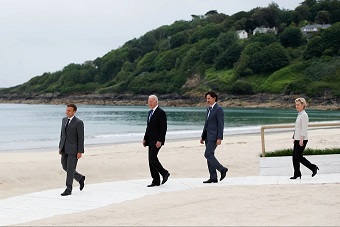West at inflection point in Ukraine war

France's President Emmanuel Macron, U.S. President Joe
Biden, Canada's Prime Minister Justin Trudeau and Euro-
pean Commission President Ursula von der Leyen walk
along the boardwalk during the G7 summit in Carbis Bay,
Cornwall, south-west England on June 11, 2021.
Henry Kissinger predicted some three weeks ago that the Ukraine war was dangerously close to becoming a war against Russia. That was a prescient remark. The NATO Secretary-General Jens Stoltenberg in a weekend interview told Germany’s Bild am Sonntag newspaper that in the alliance’s estimation, the Ukraine war could wage for years.
“We must prepare for the fact that it could take years. We must not let up in supporting Ukraine. Even if the costs are high, not only for military support, also because of rising energy and food prices,” Stoltenberg said. He added that the supply of state-of-the-art weaponry to Ukrainian troops would increase the chance of liberating the Donbass region from Russian control.
The remark signifies a deeper NATO involvement in the war based on the belief not only that Russia can be defeated in Ukraine (“erase Russia”) but the cost shouldn’t matter. The NATO chiefs traditionally take the cue from Washington, and Stoltenberg was speaking just a fortnight before the alliance’s Madrid summit.
























